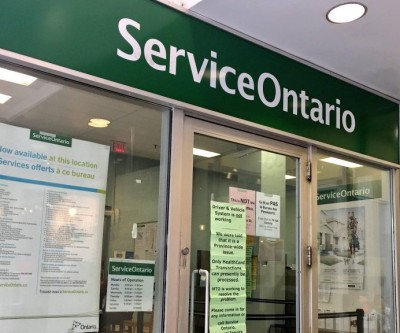Latest News
- Uber driver's account in Toronto suddenly deactivated; only source of income cut off after 'duplicate account' claim
- TDSB education chief fired by provincial supervisor; sweeping changes at Canada's largest education board
- 34 members of the "44" gang arrested in massive Durham police operation; millions of dollars in drugs and weapons seized
- Waterloo artist turns Ontario winter into art with backyard snow sculptures
- Third suspect arrested in connection with four murders in Carry the Kettle Nakoda community
Latest Ads
-
Jasmine Jewel
Call
-
Omidan group
Call
-
Amir Madanpour
Call
-
Dimo studio
Call
-
Yorkacademy
Call
-
Maryambagheri
Call
-
Shishlix Restaurant
Call

Table of Contents
- Rules for Student Work in Canada
- Types of student work in Canada
- On-campus student work
- Off-campus student work
- Types of work permits
- Internship work permit
- Medical examination
- Post-graduation work permit
- Full-time work in Canada
- Income Tax
- Social Insurance Number
- Student Work Income
- Popular and common student jobs
- Finding work in Canada
In Canada, students can work part-time during their studies. This helps them cover the costs of studying at university and living in Canada. Student work in Canada can be either general or related to their field of study. General jobs include work in restaurants, shops, hotels, and answering services on mobile phones and service offices. Students can work in these areas and receive wages.
In addition, jobs related to their field of study include work in laboratories, libraries, offices related to their field of study, and work in companies related to their field of study. These jobs help students become familiar with the work environment related to their field of study and gain valuable experience.
It should be noted that students must be familiar with the restrictions and rules regarding student work in Canada, and they must also coordinate with their university in this regard. For example, at some universities, students can only work a maximum of 20 hours per week.

Rules for Student Work in Canada
In Canada, students can work part-time during their studies, but they must be familiar with the rules of student work in Canada. Some of these rules include:
Hourly work limits: Students can work a maximum of 20 hours per week during the academic term. However, during the study breaks, this limit is lifted, and students can work up to 40 hours per week.
Minimum age: Students must be at least 18 years old to work part-time. In some cases, this minimum age may be higher for certain jobs (such as alcohol sales).
Job limitations: Students cannot work in some jobs. For example, working in mining, construction, hospital services, and some dangerous occupations are part of this category.
Work permit: Students must have a work permit to work in Canada. To obtain this permit, they must go to their university, obtain the necessary documents, and submit a work permit application.
Payment of wages: Students must receive their wages on time and adequately. Student wages should be at least the minimum wage in Canada.
Insurance: Part-time student employees in Canada must have employee insurance. Employee insurance includes health insurance, unemployment insurance, and compensation insurance.
Types of student work in Canada
It is true that studying at Canadian universities is not free, but working while studying can provide additional income and experience.
On-campus student work
This refers to jobs that take place within the university setting. These jobs do not require a work permit, and the employer is the university itself. These jobs can include working at the library, restaurant, bookstore, registration office, and more. To do student work, you must have a valid study permit, be a full-time student, and have a valid social insurance number.
Off-campus student work
The employer for this type of work is outside the university, and those who meet the following conditions can do off-campus student work:
· Have a valid study permit
· Be a full-time student
· Have at least 6 months left in their studies
· Have a valid social insurance number
Guest or transfer students, as well as courses that do not result in a degree, and courses for learning English or French are not covered by this law. Students can work up to 20 hours per week and can work full-time during holidays. Interestingly, there is no restriction on doing on-campus and off-campus work simultaneously if time allows.
Types of work permits
Internship work permit
Many courses require work experience. To do so, you need a work permit. To get a work permit, you must have a valid study permit, and the university will give you a letter stating that your employment and work are part of your educational program. This permit is free and will expire upon completion of your studies or if you have completed your internship.
Medical examination
In the health and children's section, you must first undergo a medical examination and send it along with your request.
Post-graduation work permit
This permit is full-time, and its duration is up to the length of the program, with a maximum of three years. To obtain this permit, you must have completed a program of at least eight months in length at a designated institution. You must apply for this permit within 180 days of receiving your final transcript.
Full-time work in Canada
Those who have studied full-time for more than eight months can apply for a work permit up to 90 days before the final grades are announced. At the time of applying for the work permit, their student permit must not have expired. They should provide a completion letter for the program if their student permit is still valid and they have not received a work permit before.
If your study program is less than eight months long or has a gap, you can use financial support and scholarships, or purchase permanent employment, or settle for part-time work before getting a work permit. Spouses of applicants must also have a Canadian residence permit while doing student work.
Income Tax
Foreign students working in Canada must declare their income tax by the end of April, like everyone else.
Social Insurance Number
To do student work, you must visit one of the Canadian Service Offices with your Social Insurance Number. To get a Social Insurance Number, you must have a passport and a student or work permit. A full-time student is entitled to a Social Insurance Number if they can work 20 hours per week.
Student Work Income
The average income for student work is around $10 per hour. These jobs do not require a permit and provide an opportunity to gain experience. To work off-campus, at least six months must have passed since the start of your program.
Popular and common student jobs
Accounting pays $25 per hour, simultaneous translation pays $13 per hour, customer service pays $11 per hour, and an aquarium job pays $13 per hour, while cooking and lifeguarding pay $13 and $12 per hour, respectively. There are also summer jobs, such as building painting for $13 per hour, camp counselor for $13 per hour, rehabilitation worker for $13 per hour, nurse for $15 per hour, and baker for $11 to $22 per hour.
Finding work in Canada
After receiving a Social Insurance Number, you should prepare your resume and cover letter and start looking for job postings on job search websites or on campus job centers. You can also contact professors or campus administrators and inquire about available positions.
Suggested Content
Latest Blog
Login first to rate.
Express your opinion
Login first to submit a comment.
No comments yet.


































